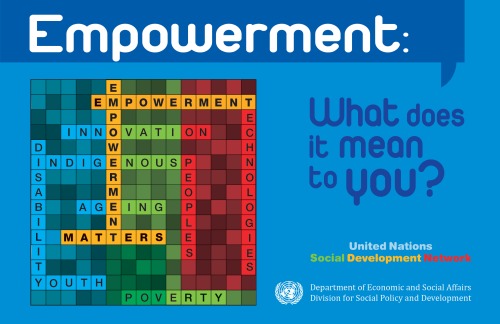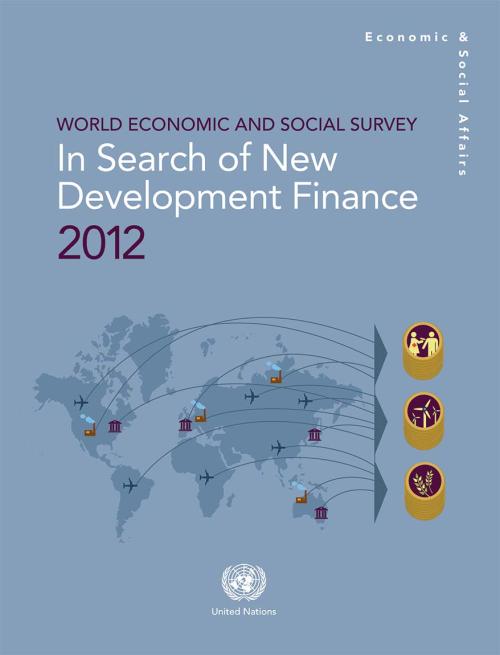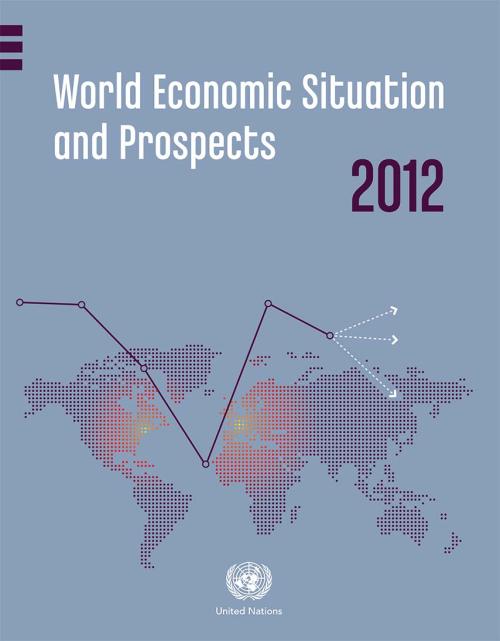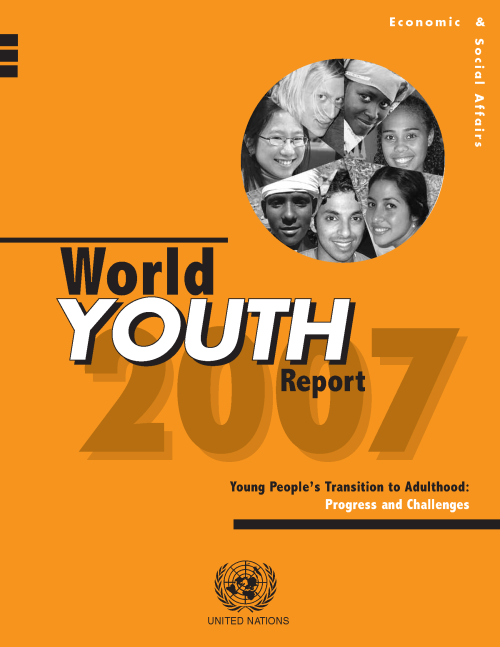Publications

The “Definitions of Empowerment” represents a collaborative effort, made possible by the answers received from people all over the world on the Empowerment theme. Their invaluable contributions were essential for the preparation of the Empowerment Publication.
In order to collect people’s ideas and experiences, the Division for Social Policy and Development (DSPD) of UNDESA launched an on-line survey on “Promoting Empowerment of People”.
We were glad to receive tens and tens of responses from young individuals, persons with disabilities, older persons, and people working for various institutions and organizations committed to social development issues. Their keen interest…
The World Economic Situation and Prospects 2013 presents a post-crisis world economy still struggling with continued weakening growth of 2.2 per cent in 2012. It projects disappointing global growth of 2.4 per cent in 2013 and 3.2 per cent in 2014 in the face of major uncertainties and downside risks. A much slower pace of poverty reduction is predicted in many developing countries and narrowing fiscal space for investments in the many critical areas needed for achieving the Millennium Development Goals. The World Economic Situation and Prospects 2013 calls for more forceful and concerted policy action at the global level, identifying fiscal and employment policies,…
In its 2012 Report, the MDG Gap Task Force has had difficulty identifying areas of significant new progress towards delivering on commitments to the Global Partnership for Development, and for the first time there are signs of backsliding. The volume of official development assistance (ODA) fell for the first time in many years, obstacles to exports from developing countries are on the rise, and numerous developing countries are facing debt difficulties.
With less than three years until 2015, there is no apparent commitment by donor Governments to reverse the trend in time, and it is likely that fewer MDGs will be reached in fewer countries as a result.
The Report finds…

The financial needs of developing countries have long outstripped the willingness and ability of donors to provide aid. Addressing this challenge, the survey proposes an international tax, combined with other innovative financing mechanisms, to raise more than $400 billion annually for development and global challenges such as fighting climate change.
Launched on 5 July, the survey reveals that in the midst of difficult financial times, many donor countries have cut back on development assistance. In 2011, for the first time in many years, aid flows declined in real terms.
“We are suggesting various ways to tap resources through international mechanisms, such as…
The report presents the yearly assessment of global progress towards the MDGs, highlighting several milestones – three important MDG targets have been met well ahead of the target date of 2015. The report says that meeting the remaining targets, while challenging, remain possible – but only if Governments do not waiver from their commitments made over a decade ago.
Based on a master set of data compiled by the Inter-Agency and Expert Group on MDG indicators led by DESA’s Statistics Division, the 2012 report outlines gains in poverty reduction and access to safe drinking water, and an improvement in the lives of slums dwellers in urban areas. The report also highlights important…

Despite scattered signs of improvement, the world economic situation and prospects continue to present challenges. After a marked slowdown in 2011, global economic growth will likely remain tepid in 2012, with most regions expanding at a pace that is below potential. In the face of subdued growth, the jobs crisis continues, with global unemployment still above its pre-crisis level and unemployment in the euro area rising rapidly. The risks to the global outlook are tilted to the downside. The euro area debt crisis remains the biggest threat to the world economy. An escalation of the crisis would likely be associated with severe turmoil on financial markets and a sharp rise in global risk…
Africa and Asia together will account for 86 per cent of all growth in the world’s urban population over the next four decades, adding that this unprecedented increase will pose new challenges in terms of jobs, housing and infrastructure. Africa’s urban population will increase from 414 million to over 1.2 billion by 2050 while that of Asia will soar from 1.9 billion to 3.3 billion, according to the 2011 Revision of the World Urbanization Prospects, produced by the UN Population Division of the Department of Economic and Social Affairs (DESA).
The largest increases in urban population are expected in the following countries: India, China, Nigeria, the United States and Indonesia…
The International Merchandise Trade Statistics: Concepts and Definitions 2010 (IMTS 2010) provides a comprehensive methodological framework for collection and compilation of international merchandise trade statistics in all countries, irrespective of the level of development of their statistical system.
The conceptual framework of IMTS 2010 reflects both the multipurpose nature of these statistics and concern for availability of the adequate data sources and data compilation procedures. IMTS 2010 follows an integrated approach to economic statistics including the use, as applicable, of common concepts, definitions, classifications and data compilation strategies.
It is…
The United Nations has updated a set of guidelines to prevent double taxation between countries, as well as to avoid tax evasion, which costs countries $3.1 trillion every year.
The UN Model Double Taxation Convention between Developed and Developing Countries (the UN Model) is used by countries as a basis for negotiation of their bilateral tax treaties.
Double tax treaties are agreements to prevent taxing income twice by allocating taxing rights over this income between two countries. These types of treaties play a key role in encouraging investment and technology transfer, while allowing governments to retain taxing rights over the money that comes from those investments…
“The increasing role of e-government in promoting inclusive and participatory development has gone hand-in-hand with the growing demands for transparency and accountability in all regions of the world,” said Sha Zukang, UN DESA Under-Secretary-General in the newly released United Nations E-government Survey 2012.
The survey, prepared by UN DESA’s Division for Public Administration and Development Management, assesses Member States’ government web portals with a focus on the provision of e-information and e-services; these services include interactive, transactional, and e-participation features that connect governments and citizens.
Member States are ranked in accordance…

On 9 February, DESA’s UN Forum on Forests Secretariat launched the Forests for People book as part of the special event marking the closing of the International Year of Forests 2011. Including articles from 75 authors from 35 countries, it celebrates the interconnections between people and forests and promotes greater understanding of their economic, environmental and social values. The 300-page fully illustrated publication is a collaborative effort between the UNFF Secretariat and Tudor Rose publishing.

The World Youth Report 2007 examines the challenges and opportunities existing for the roughly 1.2 billion young people between the ages of 15 and 24 in the world. Distinct from the 2003 and 2005 editions, it provides a regional overview summarizing the major youth development trends in the fifteen priority areas of the World Programme of Action for Youth.
The report explores major issues of concern to youth development, including employment, education, health, poverty and violence. At the same time, it highlights youth as a positive force for development and provides recommendations for supporting their essential contributions.
 Welcome to the United Nations
Welcome to the United Nations